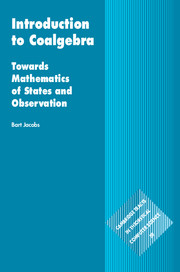6 - Invariants and Assertions
Published online by Cambridge University Press: 22 December 2016
Summary
The second important notion in the logic of coalgebras, besides bisimularity, is invariance. Whereas a bisimulation is a binary relation on state spaces that is closed under transitions, an invariant is a predicate, or unary relation if you like, on a state space which is closed under transitions. This means, once an invariant holds, it will continue to hold, no matter which state transition operations are applied. That is: coalgebras maintain their invariants.
Invariants are important in the description of systems, because they often express certain implicit assumptions, such as this integer value will always be non-zero (so that dividing by the integer is safe), or the contents of this tank will never be below a given minimum value. Thus, invariants are ‘safety properties’, which express that something bad will never happen.
This chapter will introduce a general notion of invariant for a coalgebra, via predicate lifting. Predicate lifting is the unary analogue of relation lifting. First it will be introduced for polynomial functors on sets, but later also for more general functors, using the categorical logic introduced in Section 4.3. Various properties of invariants are established, in particular their intimate relation to subcoalgebras. An important application of invariants lies in a generic temporal logic for coalgebras, involving henceforth and eventually ♣ operators on predicates (on a state space for a coalgebra), which will be introduced in Section 6.4. It uses P as the greatest invariant that is contained in the predicate P. Further, invariants play a role in the construction of equalisers and products for coalgebras.
The operator P involves closure of the predicate P under all operations of a coalgebra. In many situations one also likes to express closure under specific operations only. This can be done via the modal logic for coalgebras introduced in Section 6.5. The modal operators are themselves described via a functor as signature, and the meaning of the operators is given by a suitable natural transformation. In examples it is shown how to use such operations to describe coalgebras satisfying certain logical assertions.
The semantics of such assertions – in a set-theoretic context – is the topic of the second part of this chapter, starting in Section 6.6. First, the relatively familiar situation of algebras satisfying assertions is reviewed.
- Type
- Chapter
- Information
- Introduction to CoalgebraTowards Mathematics of States and Observation, pp. 334 - 439Publisher: Cambridge University PressPrint publication year: 2016
- 1
- Cited by



